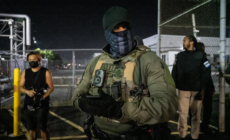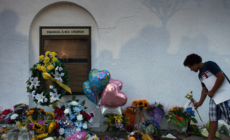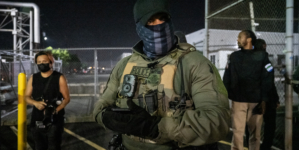-
Fed’s ‘Wait and See’ Approach Is Intact as New Risks Cloud Economic Outlook - 13 mins ago
-
As college graduates hit the job market, here are the lowest- and highest-paying majors - 14 mins ago
-
Red Sox ‘Intend to Buy’ at Trade Deadline Despie Trading Away Rafael Devers - 22 mins ago
-
Angel City takes stand against ICE raids as others stay silent - 55 mins ago
-
ICE Deports Army Sergeant’s Wife—’They’re Taking Shirly’ - 56 mins ago
-
Kraft Heinz to Eliminate All Chemical Dyes Over Next 2 Years - 57 mins ago
-
Scottie Scheffler’s Old Nemesis Costs Him U.S. Open Chance - 2 hours ago
-
Man who allegedly shot paintballs at officer during protest is charged - 2 hours ago
-
Trump Cuts G7 Trip Short Over Iran, and Senate Republicans Propose Steep Medicaid Cuts - 2 hours ago
-
Ten Years Later—Remembering Charleston and Reclaiming Our Personal Security | Opinion - 2 hours ago
As Israel Eyes Regime Change, Iran’s Opposition Is Divisive and Divided
As Israel continues an unprecedented military operation against Iran, Israeli Prime Minister Benjamin Netanyahu has openly called on Iranians to overthrow their government, going so far as to indicate that his forces’ operations “could certainly” lead to a regime change effort.
Now, a number of opposition groups based in the country and abroad are calling for a mass uprising against the Islamic Republic.
Yet the Iranian government’s domestic foes are composed of a diverse and largely fractured array of factions, including secular dissidents, militias organized along ethnic lines, Islamist militants and those seeking to restore a monarchy with ancient roots.
Most, if not all, are considered terrorist organizations in Iran, which has taken extensive efforts to suppress their activities in the 46 years since the establishment of the Islamic Republic. None have thus far been able to obtain a sufficient amount of popular support or material means to pose an existential challenge to the current system led by Supreme Leader Ayatollah Ali Khamenei.
Each group also has its own aims and tactics, some of which directly conflict with others, complicating efforts to establish a united front amid the country’s most devastating conflict since the 1980s Iran-Iraq War.
Israeli officials have declined to comment on record regarding potential efforts to foster ties with opposition groups active in Iran, but reports have emerged of operations tied to Israel taking place within the country, in addition to the large-scale air war being conducted by Israeli warplanes and drones since late Thursday.
With enthusiasm building among opponents of the Iranian government, analysts and former officials are treating with caution speculation of an insurrection capable of actually ousting the country’s leadership.

HOSSEIN BERIS/Middle East Images/AFP/Getty Images
‘Three Levels’ of Cooperation
Giora Eiland, an Israel Defense Forces (IDF) reserve major general who previously served as head of Israel’s National Security Council, told Newsweek that he believed “Israel is being assisted this way or that way by some Iranians,” though the true degree of cooperation remained opaque.
“We can assume that there are three levels of Iranians that, directly or indirectly, might help us,” Eiland said. “First, when we located some of the Israeli groups that were inside Iran and launched drones from short distances against Iranian facilities, they might have been given some assistance from locals, I cannot verify it, but this makes sense.”
“Secondly,” he continued, “Israel is probably encouraging some groups in Iran, and I cannot exclude even an approach to some of the military forces in Iran, not the Revolutionary Guard, but some of the conventional military or regular Iranian army, that maybe the time is now for them to do something. It might be done in a very, very tacit way, but I cannot exclude it.”
“And number three,” he added, “in a way, Israel, even formally is calling the Iranian to try to rise against the government.”
Yet he remained somewhat skeptical that Iranians were prepared to mobilize in substantial numbers against the government at this time, both due to the powerful influence of the Basij paramilitary force tasked with maintaining internal security, as well as the potentially problematic nature of collaborating with an enemy during wartime.
“Usually, people don’t tend to resist or to rise against their own government during the war, because it is not patriotic enough,” Eiland said. “They might respond later, after the war is over, and then they might decide the time has come to do something more than only, let’s say, to complain.
“But I cannot hide that this is the goal of the Israeli government that something similar to this will occur soon,” he added. “As I said, personally, I don’t think that might happen in the near future.”

ALBERTO PIZZOLI/PATRICK T. FALLON/AFP/Getty Images
The Monarchy and the Mojahedin
But even if the Iranian government is eventually threatened with collapse, deep uncertainties surround the projected alternatives.
The two Iranian dissident leaders that most often garner international headlines are Reza Pahlavi, son of Iran’s last shah who was deposed during the 1979 Islamic Revolution, and Maryam Rajavi, head of the Mojahedin-e-Khalq (MeK), also known as the People’s Mujahedin Organization of Iran (PMOI), and the associated National Council of Resistance of Iran (NCRI).
Pahlavi, based in Washington, D.C., has defended the Israeli attacks, dubbed “Operation Rising Lion,” and, like Netanyahu, has issued calls for Iranians to rise up against the government.
The MeK, whose leadership is based in France and Albania, has also sought to capitalize on the mayhem to claim new subversive measures within Iran, including the dissemination of anti-government messages. Just days before the Israeli operation, the group released information from its Washington office purporting to show how Iran was secretly pursuing nuclear weapons.
Iranian officials have always denied seeking a nuclear bomb, but such claims served as the pretext for Israel’s military intervention.
While both Pahlavi and the MeK claim to seek establishment of a secular and democratic Iran, they often criticize one another. The MeK, spawned as a leftist rebel group in 1965, has a legacy of conducting attacks during the reign of Pahlavi’s father before the Islamic Revolution, which the group initially supported.
“The only reason for Reza Pahlavi’s notoriety is that he is the son of the last dictator of Iran, Mohammad Reza Pahlavi, who ruled along with his father for 57 years, with repression and a dreaded secret police called SAVAK and the killing of freedom fighters, a one-party rule and plundering the people of Iran,” MeK spokesperson Shahin Gobadi told Newsweek. “The Shah eventually was forced to flee Iran as a result of a popular revolution.”
“Reza Pahlavi has nothing of his own, and anyone who is serious about the future of Iran does not take him seriously at all,” Gobadi added. “For the past four decades, he has been living comfortably with the money looted by his father. Even his former closest associates now acknowledge that his political efforts have not lasted more than a few weeks or at most a few months, due to his dictatorial approach. His meetings outside Iran, despite the publicity and hype in cyberspace, do not exceed to draw a few hundred people at best.”
Newsweek has reached out to Pahlavi’s press office and the Iranian Mission to the United Nations for comment.
Pahlavi has said he does not advocate for the restoration of the Iranian monarchy. The MeK has denied allegations that it collaborated with Israel.
But a number of observers argue that neither Pahlavi nor the MeK hold the necessary influence in Iran to substantially affect the country’s future.
“The NCRI/MEK, which relocated Iraq and collaborated with the Iraqi Army throughout the war against Iran, has been reduced to a cult-like political sect lacking any significant domestic constituency,” Ali Alfoneh, senior fellow at the Arab Gulf States Institute in Washington, told Newsweek.
“As for Mr. Reza Pahlavi, for a time, he was perceived as a symbolic alternative by segments of the Iranian public nostalgic for a bygone era, when meat was affordable and taxi drivers polite,” Alfoneh said. “However, his overt alignment with Israel is likely to delegitimize him in the eyes of broad constituencies, particularly amidst rising civilian casualties.”
Muhammad Sahimi, professor at the University of Southern California, also outlined a difficult situation for both MeK and monarchy supporters.
“Reza Pahlavi and his monarchist supporters have firmly allied themselves with Israel, and are hoping that Israel’s attacks on Iran will lead to toppling of the regime in Tehran and its replacement with them,” Sahimi told Newsweek. “Pahlavi has not condemned Israel’s attacks, and in fact has directly or indirectly supported them.”
“The MEK has had long-standing relations with Israel, and they too hope that they can come to power, although they are universally despised by Iranians from all walks of life, due to their siding with Saddam Hussein’s regime in Iraq during its war with Iran,” Sahimi said. “At the same time, their members are all in their 60s and 70s, and in exile. They are a spent force.”

Younes Mohammad/Middle East Images/AFP/Getty Images
Threats From Within
While both the MeK and Pahlavi claim to have a presence of supporters within Iran, a number of other dissident groups based within the country have waged their own anti-government campaigns, both civil and military. These include militias established among non-Persian ethnic groups such as Arabs, Azeris, Baloch and Kurds who seek greater decentralized rule or, in some cases, total independence.
Kurdish groups, in particular, have a history of seeking closer coordination with the United States, which has helped backed Kurdish forces to establish autonomous regions in Iraq and Syria. Israel, too, has long courted Kurdish groups in the region.
“Some of the Kurdish groups have been in contact with Israel over the past several decades, and some of their leaders, such as Mostafa Hejri, secretary-general of Kurdistan Democratic Party of Iran, have explicitly asked Israel for help,” Sahimi said. “When NATO imposed no flight zone over Libya in 2011, Hejri asked for the same over Iran’s province of Kurdistan.”
On the other hand, he said that “Arabs and Azeri people are overwhelmingly against any separatist movement, and a small Arab terrorist group was eliminated.” As for the Baloch, he explained that “there is small Balochi terrorist group in Iran’s province of Sistan and Baluchistan, which has been carrying out terrorist operations, but it does not have any significant military power to make any difference.”
“So, I would say, if the U.S. and/or Israel were to exploit this, the Kurds would be their target,” Sahimi said.
In addition to the Democratic Party of Iranian Kurdistan (PDKI), other Kurdish movements in Iran include the Kurdistan Free Life Party (PJAK), the Kurdistan Freedom Party (PAK) and the Komala Party of Iranian Kurdistan, which itself has splintered into several factions. Iranian Kurdish militias have at times fought against one another as well.
In a recent interview with Newsweek, Komala Secretary-General Abdulla Mohtadi said his group has renounced the use of armed means to topple Iran’s government, though he appealed for greater support from the U.S. and Israel to Iranian dissident groups.
Mohtadi said at the time that he had forged an alliance with the PDKI amid the “Women, Life, Freedom” movement protests that erupted nationwide in response to the death of 22-year-old Iranian Kurdish Mahsa Amini in police custody in September 2022.
But he remained critical of “extremist” opposition groups, including certain monarchist supporters, whom he accused of doing more harm than good to the anti-Iranian government cause.
Since Israel’s operation began, the PDKI has stated that “the first and most important prerequisite for saving Iran’s citizens from this crisis, destruction, and darkness is to completely remove and end this regime,” while PAK leader Hussein Yazdanpanah issued a statement urging “a nationwide uprising to end the regime or to reduce it in Tehran.”
However, Alfoneh noted that Iranians had a tendency to rally behind the government against perceived separatism during times of national strife, as occurred during the Iran-Iraq War and in the aftermath of World Wars I and II.
“Each time, the urban middle class, prioritizing national cohesion, set aside grievances and aligned with the central state to suppress secessionist movements,” Alfoneh said. “I am expecting Israeli-backed secessionist insurgencies in Kurdistan, Baluchestan, and potentially Khuzestan (Ahvaz), but as in the past, the middle class is likely to lend conditional support to an otherwise unpopular regime to prevent fragmentation of Iran.”
So, while he suspected that “regime change, and fragmentation of Iran through a civil war is the real strategic objective of Prime Minister Netanyahu, and that the nuclear dossier merely serves as a pretext to achieve those objectives,” he felt “the risk of a civil war and fragmentation of the country is likely to mobilize the middle class” behind the government.
Alireza Taghavinia, a Tehran-based security analyst, echoed the belief that Iranians were largely standing together in the face of Israeli attacks rather than siding with civil or armed opposition movements.
“The Iranian people have an important characteristic: they unite when there is foreign aggression against their homeland,” Taghavinia told Newsweek. “Even serious opponents of the Islamic Republic government are now standing by this government to repel Israel’s aggression against their land.”
“Iranians have a very strong sense of nationalism,” he added.
At the same time, he acknowledged that “Kurdish terrorist groups could be a security threat to Iran, not a military threat,” noting in particular alleged ties between Komala and the PDKI to Israel. Still, he argued that “Iran’s intelligence agencies and military power on its western borders are high and can control the situation.”
“Iran has both an army, the Islamic Revolutionary Guard Corps, and the Popular Mobilization Forces, and it feels no shortage of ground forces for war,” Taghavinia said. “So, there is no need to worry.”

ATTA KENARE/AFP/Getty Images
Unintended Consequences
In addition to potentially galvanizing Iran’s government, Israel’s operations and potential aid to internal actors within Iran may run other risks that contradict the interests of Netanyahu and U.S. President Donald Trump.
These include fortifying calls for the country to develop a nuclear deterrent, a debate that has increasingly intensified within the Islamic Republic amid tensions with Israel that have mounted since the outbreak of the war in Gaza in October 2023.
“Another point is that Netanyahu’s big mistake and the attack on Iran, which was coordinated by Trump, has strengthened the position of those in Iran who wanted to build nuclear weapons, and I have told you this before,” he added. “Now, most Iranians want to build nuclear weapons.”
Sina Toosi, senior fellow at the Center for International Policy, argued that propping up either Pahlavi or the MeK could ultimately harm more organic efforts for change within Iran.
“While these groups will likely seek to use the current crisis to boost their visibility and present themselves as viable alternatives, empowering them would be a grave miscalculation,” Toosi told Newsweek. “It would further discredit any externally backed initiative for political change and would undermine the broader Iranian pro-democracy movement, which overwhelmingly rejects foreign interference and sectarian or authoritarian alternatives.”
Even seeking to forge ties with individuals associated with the Iranian military, as Eiland had proposed, carries the threat of bringing to power new leaders whose interests do not align with those of Israel or the U.S., he explained.
“There are certainly factions within the Iranian political and security apparatus—especially hardliners—who may seek to use the current crisis to consolidate power, suppress rivals, or justify more aggressive internal crackdowns,” Toosi said.
“Paradoxically, some of the strongest opposition to US or Israeli interference often comes from grassroots civil society actors and reformist or moderate political currents, not the security establishment,” he added. “Undermining those internal voices—who support democratic change but oppose war and foreign manipulation—could inadvertently strengthen the very forces Israel and the U.S. claim to be opposing.”
Toosi also warned of the potential blowback associated with backing ethnic movements looking to seize on the chaos.
“Promoting such forces risks inflaming ethnic tensions, encouraging violent backlash, and destabilizing not just Iran but the broader region,” Toosi said. “A weakened central government in Iran could create power vacuums with unpredictable and highly dangerous outcomes. Attempts to leverage these groups may serve short-term tactical interests for Israel or others but would come at immense long-term strategic cost.”
The Iranian government’s efforts to crack down on subversive elements does not only target groups claiming to seek a more democratic rule, but also those with explicitly fundamentalist outlooks, such as the Islamic State militant group, particularly its Khorasan faction that conducted the deadliest attack in Iran’s history in January 2024, and Baloch Islamist movements like Jaish ul-Adl and Ansar al-Furqan.
As was the case in neighboring Iraq, following the U.S.-led invasion that toppled Saddam in 2003, militant groups often seize on national insecurity to wreak further havoc, and Iran’s porous borders with Afghanistan and Pakistan have already proven a persistent and deadly source of unrest in the region.
For now, Toosi argued that these fears, along with a mounting death toll due to Israeli strikes, appear to be reinforcing rather than undermining nationwide support for the Islamic Republic.
“The Iranian leadership is navigating an unprecedented moment of pressure,” Toosi said. “The recent Israeli strikes—as they kill civilians or target infrastructure—are likely to strongly unify various factions within the Islamic Republic and shift public focus away from domestic grievances toward external threats.”
“While discontent with the government remains, many Iranians oppose war and see foreign attacks as the greatest threat,” he added. “This dynamic could reinforce state cohesion, at least in the short term.”
Source link




















